
Gone with the Wind is a novel by American writer Margaret Mitchell, first published in 1936. The story is set in Clayton County and Atlanta, both in Georgia, during the American Civil War and Reconstruction Era. It depicts the struggles of young Scarlett O'Hara, the spoiled daughter of a well-to-do plantation owner, who must use every means at her disposal to claw her way out of poverty following Sherman's destructive "March to the Sea." This historical novel features a coming-of-age story, with the title taken from the poem "Non Sum Qualis eram Bonae Sub Regno Cynarae", written by Ernest Dowson.
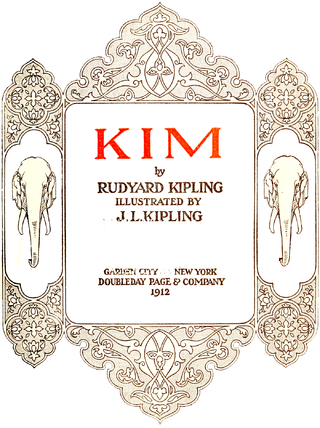
Kim is a novel by Nobel Prize-winning English author Rudyard Kipling. It was first published serially in McClure's Magazine from December 1900 to October 1901 as well as in Cassell's Magazine from January to November 1901, and first published in book form by Macmillan & Co. Ltd in October 1901. The novel is notable for its detailed portrait of the people, culture, and varied religions of India. "The book presents a vivid picture of India, its teeming populations, religions, and superstitions, and the life of the bazaars and the road." The story unfolds against the backdrop of the Great Game, the political conflict between Russia and Britain in Central Asia. The novel popularized the phrase and idea of the Great Game.

John Henry O'Hara was an American writer. He was one of America's most prolific writers of short stories, credited with helping to invent The New Yorker magazine short story style. He became a best-selling novelist before the age of 30 with Appointment in Samarra and BUtterfield 8. While O'Hara's legacy as a writer is debated, his work was praised by such contemporaries as Ernest Hemingway and F. Scott Fitzgerald, and his champions rank him highly among the major under-appreciated American writers of the 20th century. Few college students educated after O'Hara's death in 1970 have discovered him, chiefly because he refused to allow his work to be reprinted in anthologies used to teach literature at the college level.

Jacqueline Susann was an American novelist and actress. Her novel Valley of the Dolls (1966) is one of the best-selling books in publishing history. With her two subsequent works, The Love Machine (1969) and Once Is Not Enough (1973), Susann became the first author to have three novels top The New York Times Best Seller list consecutively.

Katie Scarlett O'Hara is a fictional character and the protagonist in Margaret Mitchell's 1936 novel Gone with the Wind and in the 1939 film of the same name, where she is portrayed by Vivien Leigh. She also is the main character in the 1970 musical Scarlett and the 1991 book Scarlett, a sequel to Gone with the Wind that was written by Alexandra Ripley and adapted for a television mini-series in 1994. During early drafts of the original novel, Mitchell referred to her heroine as "Pansy", and did not decide on the name "Scarlett" until just before the novel went to print. PBS has called O'Hara "quite possibly the most famous female character in American history..."
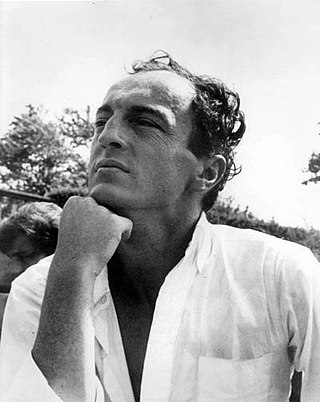
Francis Russell "Frank" O'Hara was an American writer, poet, and art critic. A curator at the Museum of Modern Art, O'Hara became prominent in New York City's art world. O'Hara is regarded as a leading figure in the New York School, an informal group of artists, writers, and musicians who drew inspiration from jazz, surrealism, abstract expressionism, action painting, and contemporary avant-garde art movements.

James Patrick Donleavy was an American-Irish novelist, short story writer and playwright. His best-known work is the novel The Ginger Man, which was initially banned for obscenity.

Appointment in Samarra, published in 1934, is the first novel by American writer John O'Hara (1905–1970). It concerns the self-destruction of the fictional character Julian English, a wealthy car dealer who was once a member of the social elite of Gibbsville. The book created controversy due to O'Hara's inclusion of sexual content.

Tender Is the Night is the fourth and final novel completed by American writer F. Scott Fitzgerald. Set in French Riviera during the twilight of the Jazz Age, the 1934 novel chronicles the rise and fall of Dick Diver, a promising young psychiatrist, and his wife, Nicole, who is one of his patients. The story mirrors events in the lives of the author and his wife Zelda Fitzgerald as Dick starts his descent into alcoholism and Nicole struggles with mental illness.

Conrad Michael Richter was an American novelist whose lyrical work is concerned largely with life on the American frontier in various periods. His novel The Town (1950), the last story of his trilogy The Awakening Land about the Ohio frontier, won the 1951 Pulitzer Prize for Fiction. His novel The Waters of Kronos won the 1961 National Book Award for Fiction. Two collections of short stories were published posthumously during the 20th century, and several of his novels have been reissued during the 21st century by academic presses.

Laurie Halse Anderson is an American writer, known for children's and young adult novels. She received the Margaret A. Edwards Award from the American Library Association in 2010 for her contribution to young adult literature and in 2023 she received the Astrid Lindgren Memorial Award.
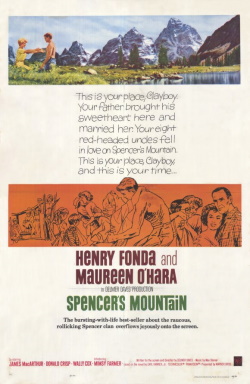
Spencer's Mountain is a 1963 American family drama film written, directed and produced by Delmer Daves, from the 1961 novel of the same name by Earl Hamner Jr., and starring Henry Fonda and Maureen O'Hara. The supporting cast features early appearances by James MacArthur, Veronica Cartwright and Victor French, while longtime film actor Donald Crisp portrays "Grandpa" Spencer. Wally Cox, Virginia Gregg, Lillian Bronson, Whit Bissell and Dub Taylor also appear.

Pal Joey is a 1940 musical with a book by John O'Hara and music and lyrics by Richard Rodgers and Lorenz Hart. The musical is based on a character and situations O'Hara created in a series of short stories published in The New Yorker, which he later published in novel form. The title character, Joey Evans, is a manipulative small-time nightclub performer whose ambitions lead him into an affair with the wealthy, middle-aged and married Vera Simpson. It includes two songs that have become standards: "I Could Write a Book" and "Bewitched, Bothered and Bewildered".
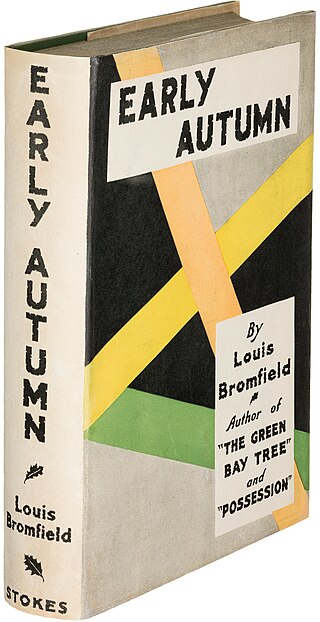
Early Autumn is a 1926 novel by Louis Bromfield. It won the Pulitzer Prize for the Novel in 1927. In 1956, producer Benedict Bogeaus announced that he was adapting the book into a film to be titled "Conquest," but the film was never made.
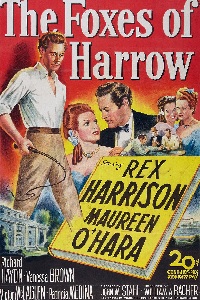
The Foxes of Harrow is a 1947 American-British adventure film directed by John M. Stahl. The film stars Rex Harrison, Maureen O'Hara, and Richard Haydn. It is based on the novel of the same name by Frank Yerby, the sixth best-selling novel in the US in 1946.
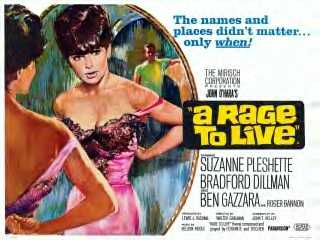
A Rage to Live is a 1965 American drama film directed by Walter Grauman and starring Suzanne Pleshette as a woman whose passions wreak havoc on her life. The screenplay by John T. Kelley is based on the 1949 novel of the same name by John O'Hara.
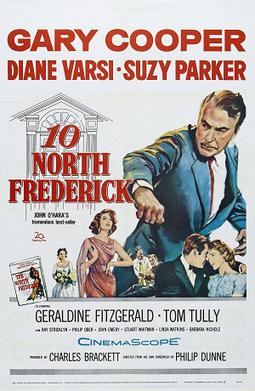
Ten North Frederick is a 1958 American drama film in CinemaScope written and directed by Philip Dunne and starring Gary Cooper. The screenplay is based on the 1955 novel of the same name by John O'Hara.
Gerald Patrick Aloysius O'Hara was an American prelate of the Catholic Church. He served as an auxiliary bishop in the Archdiocese of Philadelphia (1929–1935), as bishop of the Diocese of Savannah in Georgia (1935–1959), as papal regent to Romania (1947–1950), apostolic nuncio to Ireland (1951–1954), and as apostolic delegate to Great Britain (1954–1963).
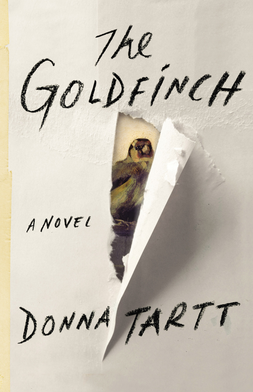
The Goldfinch is a novel by the American author Donna Tartt. It won the 2014 Pulitzer Prize for Fiction, among other honors. Published in 2013, it was Tartt's first novel since The Little Friend in 2002.


















